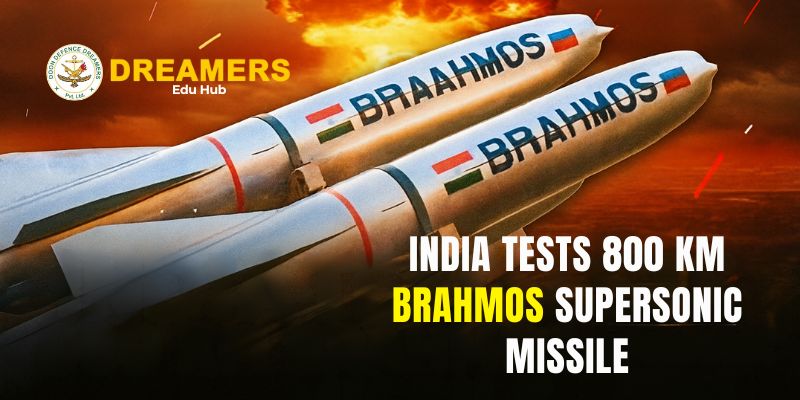India has recently conducted a successful test of its most advanced supersonic cruise missile, BrahMos, with an extended range of 800 kilometers.
This milestone marks a historic enhancement in India’s strategic strike capability.
Known for its speed, precision, and multi-platform launch adaptability, the upgraded BrahMos variant will further strengthen India’s defense preparedness and deterrence capability.
Origin & Development of BrahMos
The BrahMos missile was developed under a joint venture between India and Russia — BrahMos Aerospace.
The name “BrahMos” is derived from the Brahmaputra River of India and the Moskva River of Russia.
Initially, the missile’s range was limited to 290 km, since India was not a member of the Missile Technology Control Regime (MTCR) at that time.
After joining MTCR in June 2016, India was permitted to develop longer-range variants. Since then, BrahMos has evolved through 400 km, 500 km, and now the 800 km range versions.
Key Technical Features
| Feature | Details |
|---|---|
| Type | Supersonic Cruise Missile |
| Speed | Approximately Mach 2.8 – Mach 3 |
| Range | 800 km (latest variant) |
| Engine | Advanced Ramjet Engine |
| Propulsion System | Solid + Liquid Fuel |
| Accuracy | Circular Error Probable (CEP) < 1 meter |
| Platforms | Launchable from Land, Sea, and Air |
| Navigation | INS + GNSS + GPS/GLONASS with Jam-Resistant System |
The new 800 km variant features a modified ramjet engine and a lightweight structure, which increases both its range and velocity.
Multi-Platform Capability
One of BrahMos’s biggest strengths is its multi-platform flexibility —
-
Land-based systems: Deployed with Indian Army’s strike formations.
-
Ship-launched versions: Installed on Navy’s frigates, destroyers, and missile vessels.
-
Air-launched version: Compatible with Su-30 MKI fighter aircraft, capable of striking targets from high altitudes with surgical precision.
The missile can also fly as low as 10–15 meters above ground or sea level, making it extremely difficult to detect by radar.
The 800 km Range Variant — A Strategic Leap
The newly tested 800 km version is expected to be fully operational by 2027.
This extended range provides India with the capability to hit deep enemy targets with remarkable accuracy.
Earlier, BrahMos was limited to 400 km, but now it offers double strike depth, giving India a decisive advantage even in limited war scenarios.
Advanced Guidance & Navigation
The missile integrates cutting-edge Inertial Navigation System (INS), Satellite Guidance, and Data Link Technology, ensuring millimeter-level precision in hitting targets.
Additionally, jam-resistant GPS and terrain-following capability allow BrahMos to operate effectively even in difficult geographic and electronic warfare environments.
Strategic Importance for India
-
Extended Deterrence: With an 800 km range, India can now engage enemy assets much deeper inside their territory.
-
Precision Strike Capability: Its supersonic velocity leaves enemy defense systems with minimal reaction time.
-
Sea Denial Operations: Enhances naval anti-ship strike capabilities significantly.
-
Export Potential: India plans to export BrahMos to friendly nations, strengthening defense industry revenues and strategic partnerships.
-
Geopolitical Edge: The deployment of this missile bolsters India’s strategic balance along both the India-China and India-Pakistan borders.
Comparison with Other Missiles
| Missile | Country | Range | Speed | Type |
|---|---|---|---|---|
| BrahMos (India-Russia) | India/Russia | 800 km | Mach 2.8 – 3.0 | Supersonic |
| Tomahawk (USA) | USA | 1,600 km | Subsonic (Mach 0.7) | Cruise |
| CJ-10 (China) | China | 1,500 km | Subsonic | Cruise |
| Yakhont (Russia) | Russia | 300 km | Mach 2.5 | Supersonic |
BrahMos continues to lead the world in combining speed and precision, setting a benchmark for modern cruise missile technology.
Challenges & Future Roadmap
-
For the 800 km variant, improvements in engine efficiency, fuel optimization, and weight balance are ongoing.
-
Work is in progress to make the air-launched version lighter and more compact.
-
Export authorization and compliance with international arms regulations remain key focus areas.
-
The next phase — Hypersonic BrahMos-II, capable of speeds up to Mach 7–8, is under advanced development.
Conclusion
The 800 km BrahMos missile represents not just a technological leap but also a strategic milestone for India.
This test confirms that India now possesses the capability for long-range, high-speed, and precision strikes.
It is a proud achievement under the ‘Make in India in Defence’ initiative — reinforcing the nation’s path toward self-reliance and stronger national security.


































